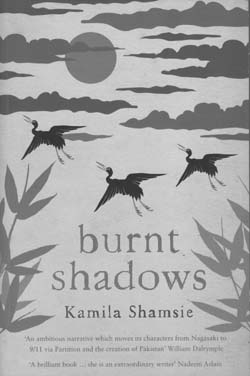On August 9, 1945, Hiroko Tanaka’s life changed forever. As she rejoiced at the thought of her future with Konrad, her German lover, a mushroom cloud enveloped Nagasaki. Hiroko survived, the design on her silk kimono burning its imprint on her back. The title of the book remains a constant reminder of the horror that was Hiroshima and Nagasaki. Burnt Shadows is a novel of almost epic proportions with a theme of loss and anguish, hope and renewal. The victim of the atomic bomb comes to Delhi on the cusp of partition and finds love. She finds Sajjad who is attached to his Dilli and his mohalla, only to find fate and the circumstances of the day relocating him and his Japanese bride to Karachi. And this is the story of their lives, of their son and friends, as Pakistan itself changes with Islamization and the Afghan struggle against Soviet occupation and the darkness that followed 9/11.
Kamila Shamsie is not constrained by sequence or continuity. Decades pass before the narrative is resumed, the past occasionally glimpsed in sepia to lend substance to the present. And decades pass again before the thread is picked up at yet another defining moment. Hiroko Tanaka remains the central connecting strand, but the other characters come vividly to life as time unfolds—her husband Sajjad for whom Dilli will always be home and Raza, the bright and self-absorbed son, who is yet to find himself. As does Harry, the Englishman turned American, who connects the past and the present. There is Ilse, Konrad’s sister, who befriended Hiroko on her lonely arrival in Delhi and who has the courage to seek and find freedom for herself. And if these are the main characters in this remarkable narrative, many others appear to make their contribution.

